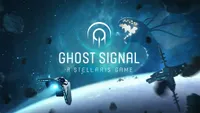Ghost Signal is the Stellaris roguelike I didn't know I needed
Explore Stellaris' universe from a very different perspective.
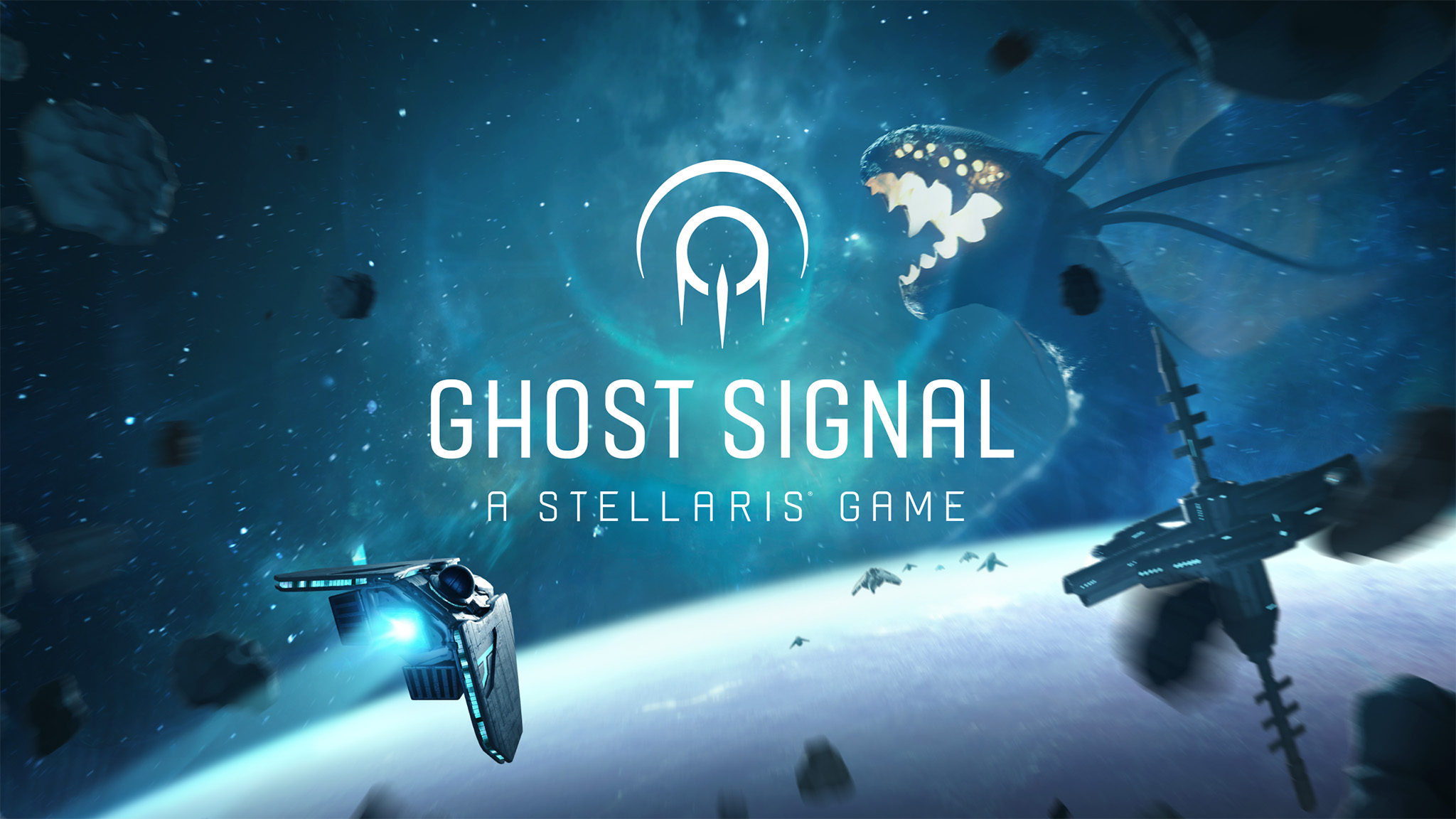
At the ripe age of 37, with a family, a job, several after-work hobbies, game nights, and still trying to fit in regular dates with my wife, I don't have time for a game like Stellaris. Don't get me wrong, I'd love to be able to sink enough time in to learn a game like that and conquer the galaxy but it's just not something I feel I can do and still maintain any kind of reasonable sleep schedule.
That's where Ghost Signal: A Stellaris Game for the Quest 2 comes in. See, Stellaris is a game that's so alive it creates its own stories unwittingly. It's a phenomenon that's seen across forums and Reddit posts and it's not something that most games ever conjure up. This universe is filled to the brim with aliens and their tales, and Ghost Signal is just one of them.
Unlike Stellaris, Ghost Signal is a roguelike game — think Hades — that rewards players' strategies in a very different way. It's a game that's just as rewarding if you only have 10 minutes to play as it is if you've got 3 hours to sink into it. That's the nature of roguelikes, anyway, but Ghost Signal is also not quite like any other roguelike I've played either, and there are a lot of roguelikes on our best Quest games list.
It's unique enough to keep roguelike fans coming back for more and, I wager, similar enough to Stellaris that it'll convince fans of the original to come back to this universe for a view from a different perspective. Instead of commanding fleets of vehicles across multiple solar systems and galaxies, you're in command of just one ship that can be upgraded and changed out as you progress.
The basics
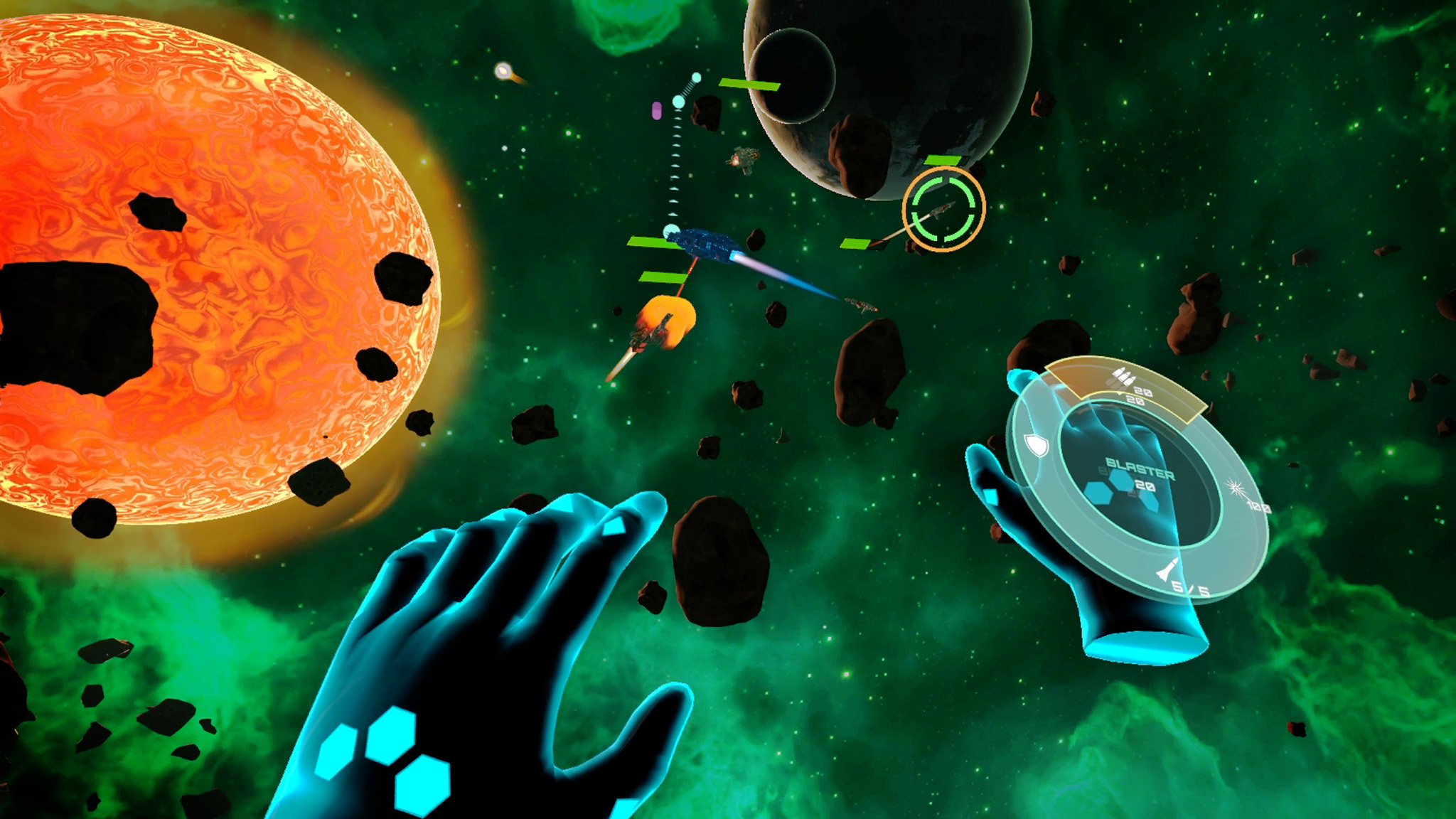
If you're unfamiliar with the roguelike formula, here's how it works. You'll begin in a home base of some kind — in this case, a space station — where you can upgrade your character (ship) using points or currency earned from your time in the game. When you're ready, you'll venture out into the world — in this game, space — where you'll take on enemies and explore regions unknown to find more treasure and further upgrade your vessel.
Ghost Signal's story revolves around a space anomaly that brings you through a loop in time, helping to explain the roguelike mechanics of dying and respawning back at your space station each time.
Instead of controlling legions of ships, you'll be the pilot of a single vessel trapped in a space-time loop in an attempt to find a signal coming from the far reaches of space.
Each location on this galaxy map is visited in order, going from the left side of the map to the right as you progress. Every gameplay session in space is completely randomized, although the general shape of the galaxy map is the same throughout. The flow of things typically brings players through several encounters — not all of which are battles — culminating in a boss battle after maybe a dozen encounters or so.
Get the latest news from Android Central, your trusted companion in the world of Android
Since you'll be warping between locations, you'll choose paths throughout your journey, oftentimes deciding between heading to an epic battle for unique rewards or stopping at the Tinkerers to heal up. You can only warp so far, after all, so it makes sense that you'd need to choose a path to get to a certain system, just as Stellaris has its "choke points" that act as gateways to systems.
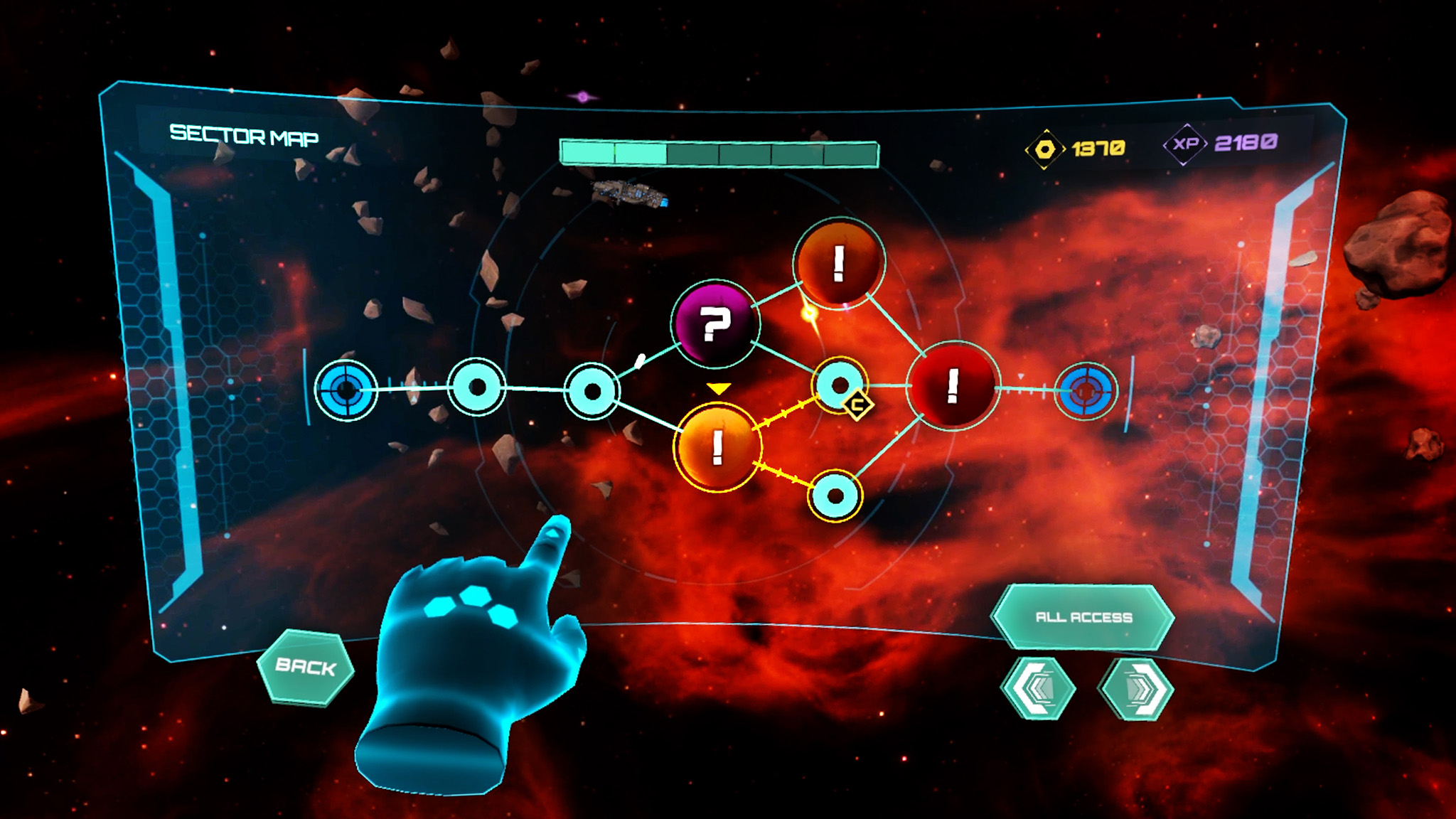
Throughout your time in the galaxy, you'll pick up power-ups that are only available to use during that particular run. These power-ups are collected mainly by visiting aliens that you come across throughout your travels, all of which are incredibly interesting, unique, and initiate dialogs with you that feel right in line with what a Stellaris game should offer.
The galaxy map offers multiple destinations along a linear progression line eventually culminating in finding where the ghost signal eminates.
Once you die, all the power-ups you've collected from the previous session disappear forever. These power-ups are invaluable in combat and build upon the permanent stat increases that you purchase at the space station.
Unlike regular old Stellaris, combat in Ghost Signal isn't about the numbers and it's anything but passive. Like other roguelikes, this game's combat is all about action, but that doesn't mean it feels like combat in other roguelike games.
The mystery of chessboxing
Ghost Signal's general gameplay arc is maybe a bit like chessboxing. You'll venture through a round or two of strategic maneuvering in the galaxy map — maybe stopping at a trader to buy power-ups or roll the dice by visiting a space creature that may be friendly or hostile — followed by at least one combat scenario where you can employ the use of the abilities you just got.
Since combat is real-time, you'll control your ship while it navigates space but not in a direct way as you might imagine. Instead of controlling your ship with a joystick — something that would be difficult in 3D space, especially given all the stuff that happens in combat — you'll chart paths using the Quest's controller or just your hands if you opt to use hand tracking.
Ship movement is semi-automated on a path you chart, but combat is fully realtime and gets intense.
While your ship navigates the path you've drawn, you're free to aim at any enemies or obstacles in the way and use any manner of weaponry you've got at your disposal. But don't think this is an on-rails shooter. These are open areas that you have free reign over.
With the right controller, you can take aim and fire bullets, lasers, and missiles, each of which can only be shot so many times before running out of ammo or hitting a cool-down wall.
Shields and hulls are affected differently by your choice of weaponry.
As in Stellaris, ships have hull and shield strength — although they don't necessarily have shields — and using the right weapon will get the job done more effectively. Lasers are best against shields while bullets are best against hulls. Missiles decimate everything but you have a very limited number of these and it's smart to save them for when you're in a pinch.
Ghost Signal's combat felt a bit strange at first since I wasn't in direct control of the ship but it turns out this is a good choice. You're free to carry on strategies and concentrate on firing at enemies while your ship moves, although you can have the ship boost out of the way of battering ram frigates at any time by pressing and holding B.
Like ammo, boosting isn't infinite and will have a cooldown before it can be used again. In other words, use it strategically, especially in battles with multiple battering ram frigates.
The depths of space
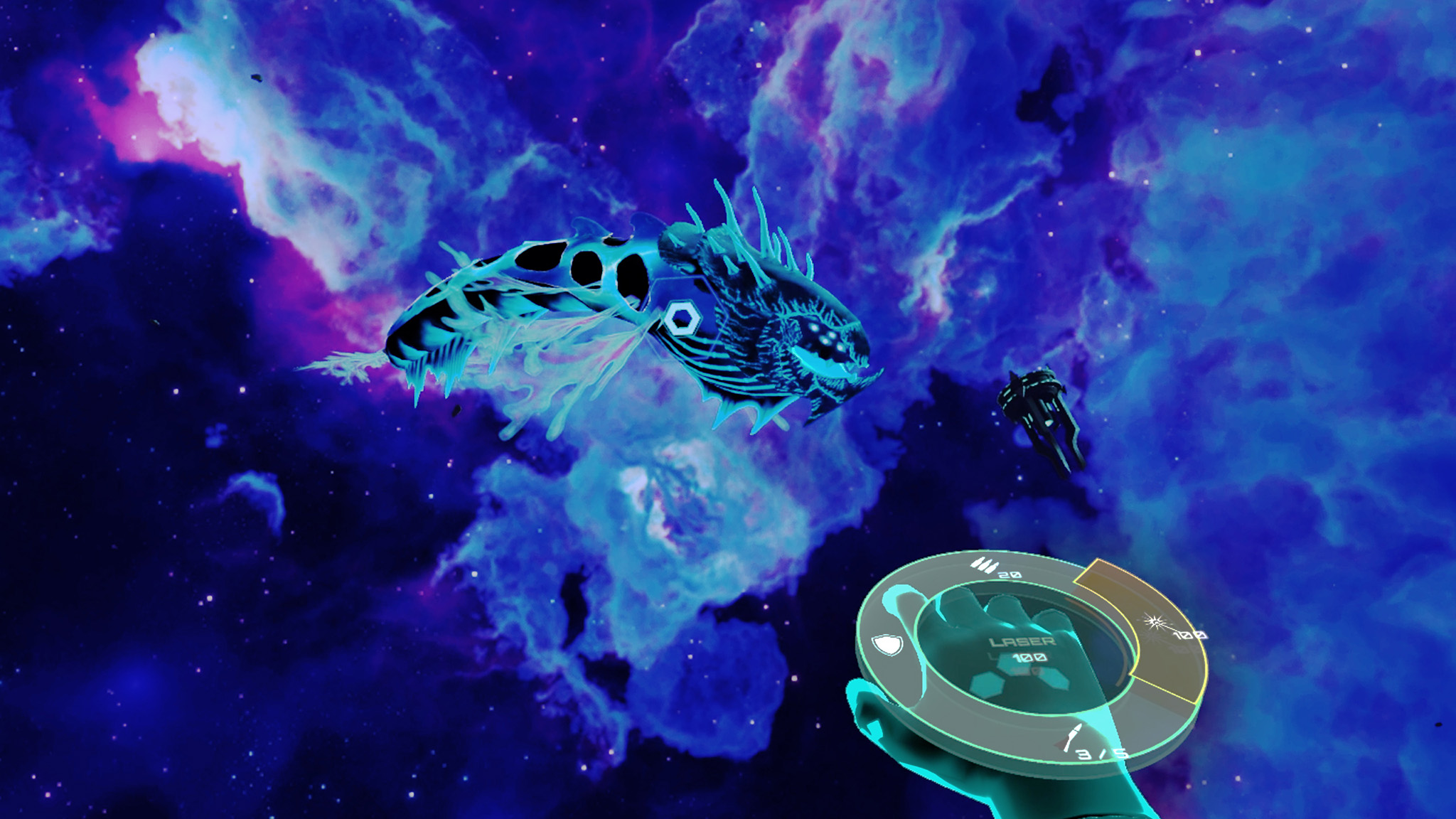
Ghost Signal: A Stellaris Game isn't as deep a game as Stellaris is, but that's by design. It's a game that's designed for players who don't want to or can't invest the time required to understand a game that complex and involved. While that might sound initially negative, it's not meant to.
Instead, this is a title that's perfect for those of us that want to explore the richness of Stellaris' galaxies and get to know its alien races without that investment. If anything, it's perfectly rewarding for a day in age where we expect instant gratification.
The game is designed to be played seated and can even be played entirely with hands instead of controllers.
It's also incredibly well-tailored to the VR experience. Friction in this game is low since it doesn't take much time at all to get into the game and play and, better yet, it can be played perfectly while seated. Ghost Signal also allows players to play entirely with their hands, and it works quite well. I opted to play the majority of the duration with controllers but players who like hand-tracking games will seriously love the experience.
In fact, Ghost Signal lets players know it's best experienced while seated since you can easily move around the world by "grabbing" the view with your grip buttons and sliding it around to get a better view, similar to Demeo, Nock, or Gods of Gravity.
And there's a lot that I didn't even get to here—collecting companion creatures, harvesting asteroids, scanning objects with the left controller, delving into ship upgrades, and buying new ships. There's a ton to explore here and hours of gameplay to enjoy and that's all for just $20. It's a fantastic example of how to tailor an experience to VR headsets and yet another game that's a must-have title for Quest.
Ghost Signal: A Stellaris Game
Explore the far reaches of space as a lone pilot trapped in a time-space anomaly hunting down a mysterious ghost signal. It's a surprising roguelike take on the deep 4x strategy original.
Buy at Quest store

